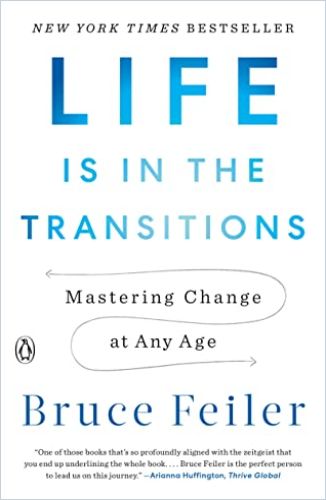Best-selling author Bruce Feiler offers sound, compassionate strategies for dealing with lifequakes: powerful events that reshape your identity and your world.

Lifequakes
The stories you believe about yourself determine the quality of your life, says New York Times best-selling author Bruce Feiler. Many people struggle to find meaning and purpose when disruptive events, such as a divorce or health crisis, unexpectedly throw their lives off course. Feiler explains how you can make the most of these difficult transitional periods. He argues that they are potent times for exploration, healing and reflection. Cast yourself as a hero, a caretaker or a warrior in your new life story, Feiler urges, and recognize that only you can write it.
The Hero
Negative events or situations can disrupt your ideal version of your life story. Italians call these moments the lupus in fabula, or the “wolf in the fairy tale.” The narrative you tell yourself about your life shapes your sense of purpose or meaning.
We must never give up on the happy ending. We must insist that our oscillating narratives can turn upward as well as down.Bruce Feiler
After Bruce Feiler’s father received a diagnosis of Parkinson’s disease, he attempted suicide. Hoping to help his father find meaning in his new life, Feiler collaborated with him on an autobiography. The exercise helped his father rediscover purpose and joy. Feiler then became a life historian, guiding hundreds through the process of reclaiming their life stories.
Lifequakes
Sometimes in life, people experience lifequakes: tumultuous events that disrupt your routines, your narratives and your sense of self. You may voluntarily trigger a lifequake by, for example, cheating on your spouse or leaving your job. Or a lifequake could happen to you, say, when your partner leaves you or your home burns down. Lifequakes don’t just redirect your life; they often feel crippling, unfair and inconvenient. But, Feiler believes, they can trigger self-reflection and a search for meaning.
Lifequakes involve a fundamental shift in the meaning, purpose or direction of a person’s life.Bruce Feiler
A lifequake’s “aftershock” brings devastation, which, Feiler points out, triggers your search for a new approach to your life. Lifequakes also make you re-imagine your self-narrative or autobiographical story. Embrace the process of adapting to your new reality.
Feiler urges you to make a conscious choice to transform upheaval into a growth opportunity. When you experience a catastrophic life event, voluntarily engage in the transition process and redirect your life. Your transition won’t have a clear, predictable or linear trajectory; prepare for the unexpected, Feiler warns. Accept that you spend much of your life in a transitional state; transitions can be positive and healing.
Accept Difficult Emotions
Don’t resist your life transition.
Acceptance is difficult precisely because it involves drawing a line we usually don’t want to draw and entering a realm we usually don’t want to enter.Bruce Feiler
You may frequently feel hopeless after a lifequake, especially if you lost something or someone permanently, such as a home or loved one. But grief can compel you to focus your attention inward, prompting self-reflection. Feiler encourages you to give yourself permission to surrender to feelings of sadness, and to turn to friends, family or loved ones for emotional support and a sense of belonging. Embrace radical honesty by admitting your feelings.
Mark Painful Experiences
Feiler advises creating a ritual to signify your entrance into a new cycle of your life. Rituals are symbolic actions, ceremonies or gestures that help you establish meaning during transitional times. Rituals give you a sense of control, deepen your bonds with your community and help connect you to a higher purpose.
Some people keep symbolic objects or mementos to mark the passage from an old identity to a new one. Mementos and rituals integrate difficult experiences into the larger fabric of your existence and mark the passage of time as you move into the future.
Get Lost
Navigating a transition inevitably involves a period of getting lost. Being lost is an important rite of passage, as many major religions and ancient myths recognize: In the Abrahamic faiths, Moses, Jonah and Jesus get lost, respectively, in the wilderness, in a whale and in the desert. And mythic figures such as Oedipus, Hercules, Achilles and Odysseus all head into the unknown.
The bottom line: Giving up identities, whether painful or pleasurable, is a necessary precondition for making way for the new identities waiting to onboard.Bruce Feiler
Animals go through molting periods, which entail shedding horns, feathers, skin, shells and entire exoskeletons. Likewise, people must shed mind-sets, routines, habits, dreams, convictions and identities. You may shed parts of your perceived personality that no longer serve you, such as feelings of inadequacy. You may shed difficult emotions, such as fears accumulated due to trauma. Or you may shed certain lifestyle choices and beliefs or your attitude toward money to accommodate your new reality. Shedding means closing certain chapters of your life to embark on new ones.
Chaos into Creativity
Create your new life by cultivating new skills, modes of expressing yourself or talents.
In turning to creativity, we tap into the part of us that’s most human: the ability to generate new life.Bruce Feiler
The 20th century French painter Henri Matisse, for example, found himself confined to his bed for the last 14 years of his life, unable to hold his paintbrush or stand at an easel. He created a new art form by making cut-outs of graphic shapes to depict circuses and dancers. Rather than give up, Matisse created a new, prodigious body of work.
Tony- and Emmy-award winning choreographer Twyla Tharp explains in her book The Creative Habit that when you feel stuck, inspiration often comes from reflecting on your past. Find inspiration in the moments of your life that resonate with you and show you a path to the future.
Moshé Feldenkrais created a mind-body healing practice, the Feldenkrais method. Responding to change, according to Feldenkrais, means changing the way you move. When creating a new life story, rewrite your body’s story, too.
Out in the World
Feiler encourages you to seek feedback on your new direction from friends, neighbors or colleagues.Document your gender transitioning process, for example, or share news that you’re going into business for yourself. Publicly sharing your milestones, Feiler is convinced, helps end your transitional period. Tell your story as you see fit. Only you determine the meaning you find in your experiences.
Accept New Destinies
Feiler reframes crucial Jungian ideas, including the wounded heart, the “little death,” and the hero’s journey to convey the necessity of embracing change, however unexpected. He states and restates his themes of rebirth, and of the crucible of events you never sought nor wanted. Feiler provides comfort to the traumatized and clear, workable guidance to those with sufficient distance from their trauma to move forward out of pain in this worthwhile, intelligent manual.
Bruce Feiler also wrote The Secrets of Happy Families and The Council of Dads.





